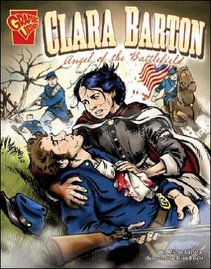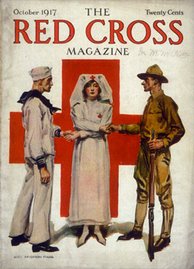VIDEO FROM IneComCOmpany
Thursday, July 5, 2007
Tuesday, July 3, 2007

spring text
The door that nobody else will go in at, seems always to swing open widely for me.”
Clara Barton
Harlowe Barton , born on Christmas day December 25, 1821 in North Oxford, Massachusetts (Civil War Biographies, n.d). Clara was home schooled, and at the age of 15 she became an educator. This was the start of Clara's life long humanitarian journey.
Early on in Clara's teaching career she noted the lack of free public schools in New Jersey. She managed to get enough funding for the development of a free public school in Bordentown, NJ in 1853 (New Jersey Womens History, 2002). However, when the school was built the town decided to hire another principal. Clara decided to give up teaching and pursue another passion.
 In 1861 Clara Barton became a copyist for the U.S patent office under the office of President Abraham Lincoln. During the same year on April 12 at Fort Sumter, South Carolina - Civil War has started. It was not long after that she finds herself tending to the wounded, from the battles.
In 1861 Clara Barton became a copyist for the U.S patent office under the office of President Abraham Lincoln. During the same year on April 12 at Fort Sumter, South Carolina - Civil War has started. It was not long after that she finds herself tending to the wounded, from the battles. 1861 - Battle of Bull Run - Clara tended to the wounded, and forms a grass roots agency that provided relief efforts.
1862 - Clara's Father Dies on March 2
- August 3 Clara officialy gets permission to transport provisions to the battlefield
Battle of Cedar Moutain - August 13 Clara arrives at the battlefield. Spending 2 days, and 2 nights she tends to the wounded as well a the confederate prisoners.
September 1- Battle of Chantilly- Clara tends to the wounded soon after she arrives at Fairfax, and the injured for train evacuation to Washington D.C.
September 14 - Battle of South Mountain, Maryland - Clara tries to establish a field hospital, and aids in distribution os supplies. She realizes after a failed assault that establishment of small field hospitals would greatly increase the chances of survival rate for the soldiers.
September - November - Battle of Antietem, Maryland - Clara Barton arrives in Potomac river with much needed supplies for the surgeons. A bullet nearly took her life, and through long hours of tending to the wounded she contracts typhoid fever. This does not deter her mission to provide her services where it is needed.
1863 - Frances D. Gage an abolitionist was at the time caring and educating former slaves, and freedmen. Clara being a former educator joined Ms. Gage in her the cause for developing equali rights.
August 10 - 11- Siege of Ft. Wagner - distribution of more supplies, and helps to establish a field hospital
1864 - January - Clara returns to Washington, D.C. for more supplies
Battle of Cold Harbor, Virginia - Clara Barton is appointed by Commander General Benjamin F. Butler of the Army to take charge nursing, and the dietary needs of the X Corps hospital. Dubbed as the "flying hospital" they tended to the wounded from the battlefield of Petersburg.
August - First Geneva Convention - For the Amelioration of the Condition of the Wounded and Sick in Armed Forces in the Field, Geneva, 12 August 1949 -
This was happening beyond Clara's borders, and she was not aware of its existence at the time. This was taking place in Switzerland, and the establishment of the International Committee of the Red Cross. The United States is not yet a member at this time.
1865 - March 10 one of Clara Burtons brother, Stephen dies
- April 9 General Robert E. Lee surrenders , and marks the end of the Civil War
After the war Clara Barton was adviced by her physician to rest. She travelled to Europe in 1869 , and here she educated herself about the working of the International Red Cross, and the Geneva Convention of 1864. When she returned to the United States her first priority was for her country to be a part of that treaty.
President Ruther B. Hayes was not certain about signing the Geneva treaty at the time. Clara Barton however was adamant about pursuing humanitarian efforts in the United States. She formed the American Association of Red Cross in 1881, with its main thrust as solely being for disaster relief. Through the urging of Clara Barton the next President Chester A. Arthur did sign the Geneva treaty im 1882.
 > Women were not allowed in the battlefield until Clara Barton received permission.
> Women were not allowed in the battlefield until Clara Barton received permission.> Clara Barton saw the need to bring medical supplies to the battlefield, and keep an accounting of their rations.
> After the war she kept a record of prison survivors, and 13,000 Federal soldiers who had died. This helped locate them, and mark the gravesites.
> Clara Barton saw past cultural, and gender barriers. She had one mission, and this was to help those that needed her help.

Subscribe to:
Comments (Atom)


